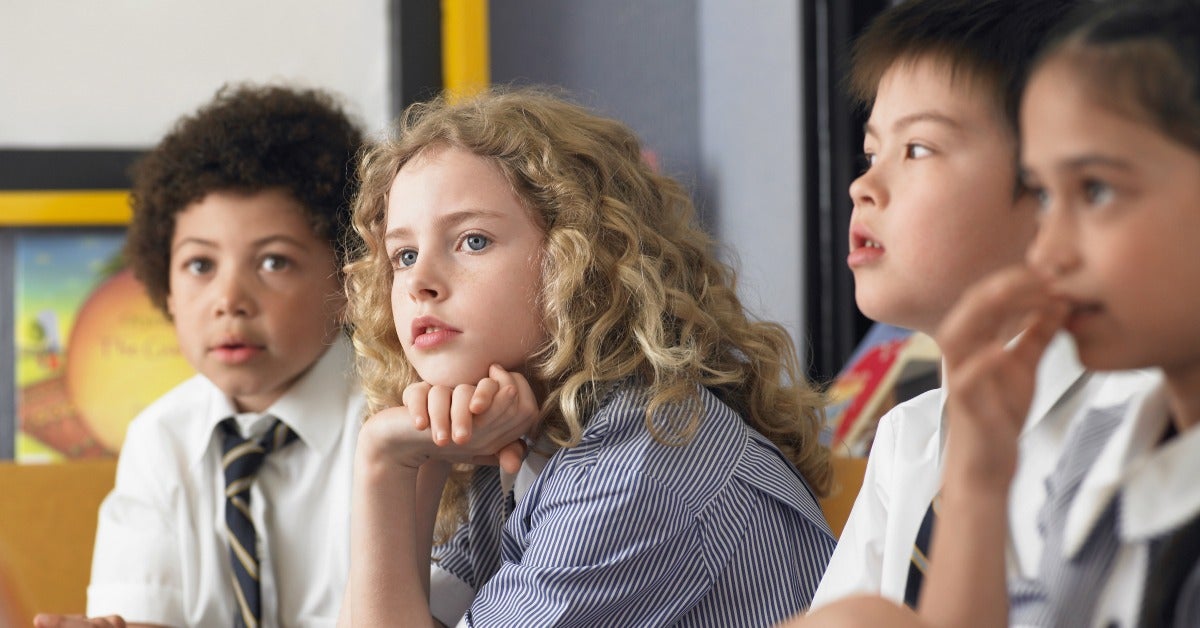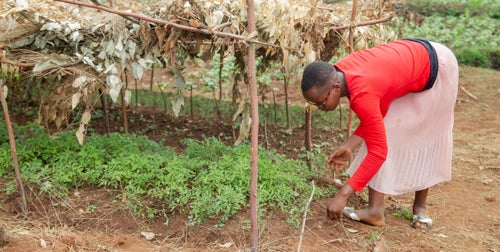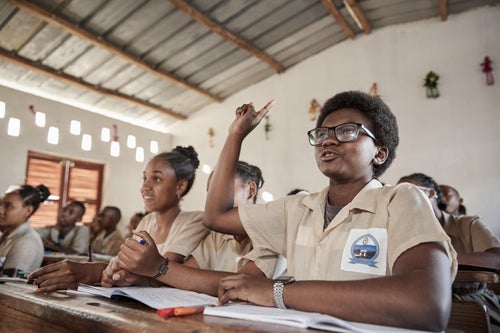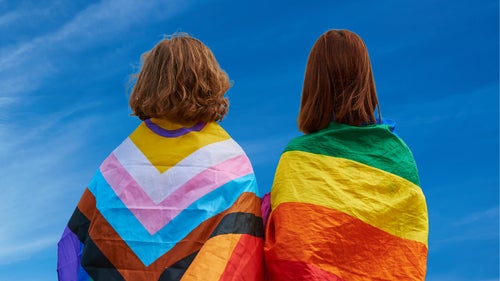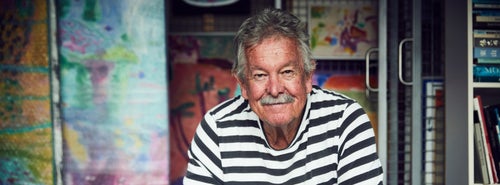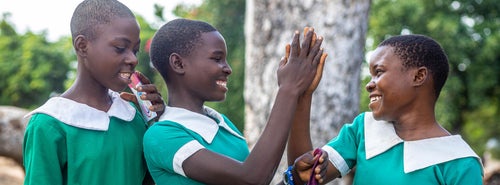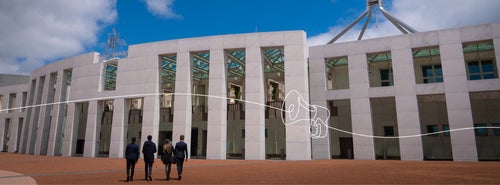This month, Australia is furiously debating how the Government should spend our money.
We’ve heard from plenty of politicians and shock jocks but some of the most important voices have been lost in the frenzy. Has anyone stopped to ask a child?
Almost all areas of the Federal Budget will impact the lives of children but often, young people simply don’t have a say in the matter.
Yes, this is enormously complex stuff but children are highly qualified to contribute.
Young people are experts in their own lives and experiences. Adults can’t make informed decisions in the best interests of children if we rely on our own assumptions about how they experience the world. Policymakers should respect children as complex and thoughtful people and take the time to listen.
The Australian Government committed to doing exactly this when it signed the UN Convention on the Rights of the Child. Article 12 gives every child the right to express her opinion and to have it seriously considered when adults are making decisions about her life.
That means giving children and young people a meaningful chance to contribute to the budget planning process - particularly for those in vulnerable situations who find it difficult to make themselves heard.
So what do young people really want from the Government? Read on for three common answers.
Help children out of poverty
“Helping children and people who have lost everything and giving them a better life after they've lost everything.” – Year 8 student, WA
In 2014, UNICEF Australia asked more than 1,500 children and young people across the country how they want the government to spend its money and one response came up time and time again.
Children thought it was unfair that anyone living in a wealthy country like Australia should have to live in poverty. They were acutely aware that too many young people were homeless and in danger of physical and mental harm.
“I think the Government should spend its money on the poor, for shelters, food and water.” – Year 6 student, VIC
These children had seen in their local communities what the data reveals on a national scale: there is persistent and entrenched poverty across parts of the Australian community. Today, 731,000 children under the age of 15 are living in poverty throughout Australia - that’s nearly one in every six children in the country. Children in single-parent families are at particularly high risk, with an astounding 40 per cent living in poverty. And things are getting worse: child poverty increased by 2 percentage points in the decade to 2014.
Children also told UNICEF Australia what they think needs to change. They wanted more financial support for people living below the poverty line and for this to be matched with equal opportunities and support to find jobs.
“People in poverty - we should help them start again and live their dreams.” – Primary school student, ACT
UNICEF Australia supports recommendations by the Australian Council of Social Service (ACOSS) for the government to reform the Family Payments System, better target assistance and protect children from poverty.
Give Aboriginal children a good start to life
“I worry about the Indigenous Australians as I am of Aboriginal descent. I know I have had it lucky but others that I have met haven't.” – AJ, 12, NSW
The Australian Youth Representative to the UN, Paige Burton, has made it her mission to listen to young people across the country and take their concerns all the way to the UN General Assembly in New York.
Wherever she goes, Paige hears about the deep inequality facing Aboriginal and Torres Strait Islander children.
"I wish the government knew how many kids are being left behind in the foster care system. The reality is most are moved from home to home, split up from siblings and a devastatingly large portion of these kids are Indigenous."
The numbers really are shocking. Aboriginal and Torres Strait Islander children are 9.8 times more likely to be removed from their families by child protection authorities and placed in out-of-home care. And in the last 20 years, the number of Indigenous children living away from their families has increased by 500 per cent.
UNICEF Australia supports community organisations like SNAICC, the Secretariat of National Aboriginal and Islander Child Care, in calling for change. The government needs to work together with Indigenous communities to eliminate their over-representation in out-of-home-care.
“I wish the government saw the true value of investing in the proper protection of children and early childhood programs,” says Ella.
“I wish they knew that getting it right at this stage would change the entire trajectory of someone's life."
She is absolutely right: early moments matter. The first 1,000 days of a child’s life are a critical opportunity to support brain development and lay the foundation for their future health and happiness. Young children need stable, nurturing care with good nutrition, stimulation and protection from stress.
UNICEF’s global experience has shown that investing in early childhood is one of the most cost-effective ways of helping children to reach their full potential. One 20-year study showed that disadvantaged children who participated in quality early learning as toddlers went on to earn up to 25 per cent more as adults.
That’s why UNICEF Australia is calling on the Government to provide at least 20 hours of subsidised quality early learning to all children, regardless of their parents’ activities.
"We need to support accessible early childhood education and care in remote areas. We need to invest in preventative measures to properly respond to states of crisis. I wish the government were listening to the evidence and to the knowledge of Aboriginal women and organisations."
Give more Australian aid to the world’s most disadvantaged children
“I think the Government should spend its money on ending poverty and helping children that don't have things in different countries that they need to survive.” – Year 6 student, SA
Young Australians are particularly concerned for other children living in dangerous places, fleeing their homes and struggling without basic needs like water. They told UNICEF Australia how important it is for all children - including those in other countries - to be treated fairly, to survive and develop in a safe environment.
Yet, these are tumultuous times for Australian aid.
In 2015, the Government announced it would cut the aid budget by $3.7 billion over three years. Aid to the world’s poorest people has now been slashed to its lowest level in history: just 23 cents in every $100 of national income.
"To the government: please end poverty." – Abdirhman, nine, SA
UNICEF Australia is right behind Abdirhman. We want the government to define a timeline for returning the aid budget to its pre-existing level of 30 cents in every $100 of national income within the current parliamentary term. And we’re calling for an increase to 70 cents by 2030.
This vision of a more generous Australia continues to come up in Paige Burton’s conversations with young people. They care about human rights and they want their government to invest in sustainable development.
"I wish the government knew that young Australians care about international health crises, especially those facing women in Africa. Women should have the right to adequate maternal healthcare."
Keep listening
The right to participation is a child’s gateway to all of her other rights to safety, education and healthy development. All adults can do something to help open this gateway a little wider.
As parents, as businesspeople and as active members of our communities, we can simply take the time to listen to young people. We can give them meaningful opportunities to participate in the decisions that their lives.
Start by following the Australian Youth Representative as she continues her national listening tour and shares the everyday voices of young people across the country. And keep taking every chance you get to hear from the young, powerful voices in your life.
Related articles
Stay up-to-date on UNICEF's work in Australia and around the world



